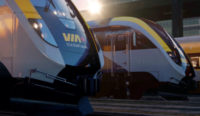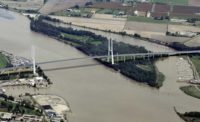A long-gestating proposal to link Newfoundland and Canada's mainland with a billion-dollar-plus,16-kilometer rail tunnel to Labrador now is in the running to be the country’s next showcase infrastructure project after winning the support of its narrowly re-elected Liberal party.
Led by Prime Minister Justin Trudeau, the party gave the proposed crossing between the two Atlantic maritime provinces, estimated to cost $1.3 billion, a prominent place in its electoral platform.
First proposed nearly 50 years ago, tunnel supporters are pushing provincial leaders in Newfoundland and Labrador, as well as federal officials, to issue a request for proposals for the project.
Danny Dumaresque, a long-time advocate for the project and a former member of the Newfoundland and Labrador House of Assembly, likens the proposed tunnel to the Confederation Bridge built in the 1990s to connect Prince Edward Island with New Brunswick.
“People have fought hard for years for this project,” said Dumaresque, a local business owner who sees the proposed tunnel providing a boost to economic development similar to what the Confederation Bridge did for PEI.
In the years after the bridge opened, travel to the island increased exponentially while unemployment dropped.
Newfoundland and Labrador are currently connected by ferry service, which is both unreliable and expensive to maintain, he contends.
Newfoundland and Labrador Premier Dwight Ball is also a strong supporter of the project.
Ball released a “pre-feasibility study last year that pegged the cost of the project at about $1.3 billion, with a 15-year construction timeline.
“The concept of a fixed link is a nation-building prospect that could potentially have social and economic benefits for Newfoundlanders and Labradorians and all Canadians,” Ball said in a press statement.
As a next step, he has proposed a $17 million feasibility study.
But Dumaresque notes a number of studies of the proposed tunnel over the years and says there is no need for another one.
The next step should be an RFP, he says.
Dumaresque, who traveled to Norway during his time as a member of the provincial assembly to look at comparable tunnel projects there, also takes issue with the cost estimate, which he believes is too high.
Citing comparable projects in Norway and advances in tunneling technology, he argues the project should cost less than $750 million.
“The studies that have been done have been a waste of time,” Dumaresque said. “If you want to know the real cost, you should prepare an RFP and put that out to tunnel building companies, of which there are 100 in the world.”





Post a comment to this article
Report Abusive Comment